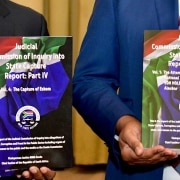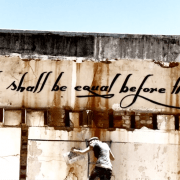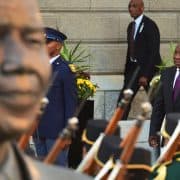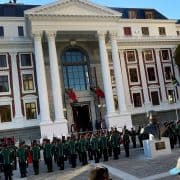|
Getting your Trinity Audio player ready...
|
Expectations that President Jacob Zuma would not address corruption with any enthusiasm in his 2017 State of the Nation Address (SONA) were not dashed – he managed just three sentences on the topic.
“The fight against corruption continues,” Zuma said. “Within the National Prosecuting Authority, the Asset Forfeiture Unit completed 389 forfeiture cases to the value of R349-million. They obtained 326 freezing orders to the value of R779-million.
“A total of R13-million rand was recovered in cases where government officials were involved in corruption and other related offences in the past year.”
The National Prosecuting Authority has been beset with controversy and scandal for years, so citizens would not be encouraged by the use of it as the poster child for anti-corruption. As in previous years, Zuma made no mention of what measures were being taken to punish those government officials and others who were caught engaging in corruption. He made no mention of efforts to clean up the Hawks, the South African Police Service’s embattled anti-corruption unit.
He did not even mention renewed efforts to crack down on wasteful expenditure, a situation that is worsening by the year.
He did not mention the worrying non-compliance in departments such as the South African Revenue Service or the continuing poor performance by state-owned entities such as the Passenger Rail Agency of South Africa or any plans to correct the situation. He close instead to praise power utility Eskom, which is far from squeaky clean, for managing to avoid load-shedding. While the utility has indeed made some progress in sorting out its precarious finances, there is still much work to be done.
Zuma also blithely spoke of the difference the government’s social grants programme was making in people’s lives – which is certainly true, but he neglected to mention what measures are being taken to address the fact that the South African Social Services Agency is mired in scandal that has yet to be resolved.
In last year’s SONA Zuma spoke of implementing measures to cut wasteful expenditure in government and carry out spot checks on those suspected to of non-compliance with supply chain management procedures. That’s as far as he went to deal with the issue of corruption.
“We have made an undertaking to spend public funds wisely and to cut wasteful expenditure, but without compromising on the core business of government and the provision of services to our people,” he said in his 2016 speech. “In 2013, the minister of finance [Pravin Gordhan] announced a number of cost containment measures. Excessive and wasteful expenditure has been reduced, but there is still more to be done to cut wastage.”
However, the reality is that some municipalities still seem to not take Gordhan’s cost-cutting measures seriously. Tone from the top is lacking, with ministers splurging on luxury vehicles freely.
Auditor-general Kimi Makwethu, in his report on local government audit outcomes which was released in June 2016, noted that wasteful and irregular expenditure measured since the 2010/2011 financial year amounted to just under R15-billion – an enormous sum of money. Furthermore, this type of expenditure was incurred by an increasing number of municipalities.
“Overseas trips will be curtailed and those requesting permission will have to motivate strongly and prove the benefit to the country,” Zuma declared in 2016. But that did not stop the likes of the secretary to Parliament, Gengezi Mgidlana, and four of his top staff reportedly spending almost R1-million on a 10-day trip to the UK, followed a week later by trips to Turkey and Switzerland to the tune of another R900 000.
While South Africans were hoping for was emphatic, confident leadership in these areas that affect all but a select few. They will have to defer their hopes for another day.








